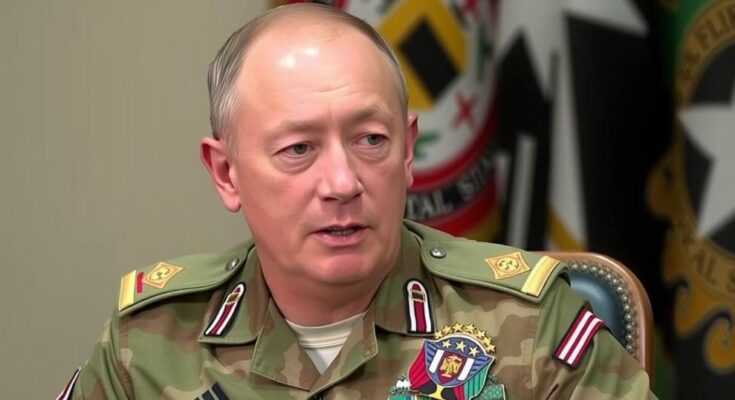Brigadier General Behrouz Esbati publicly acknowledges Iran’s severe defeat in Syria, criticizing both Assad’s rejection of proposals for military action against Israel and Russia’s misdirected bombing strategies. Despite these setbacks, he expresses intentions to mobilize resistance against new Syrian leadership while lamenting systemic failures within Assad’s regime.
In a groundbreaking admission, Brigadier General Behrouz Esbati of the Iranian military has conceded that Iran suffered a resounding defeat in Syria, a significant departure from Tehran’s historically defiant stance. Speaking at a Tehran mosque, he stated, “We were defeated, and defeated very badly, we took a very big blow and it’s been very difficult.” This acknowledgment points to a significant loss of influence for Iran in the region, particularly following the fall of Damascus.
General Esbati, who was implicated in coordinating military operations in Syria, criticized former President Bashar Assad for spurning Iranian proposals to initiate military actions against Israel from Syrian territory. He further lambasted Russia, highlighting that their operations, claiming to support Iranian goals, often undermined Tehran’s interests by targeting open fields rather than militant strongholds. This misdirection, according to Esbati, aggravated Iran’s military setbacks in Syria.
Despite the setbacks, Esbati expressed a desire to regroup and mobilize forces against Syria’s newly established leadership and called for the activation of social networks and resistance cells already in place. He outlined ambitious plans to leverage societal connections and technology to bolster Iranian influence amid chaos in Syria. However, a senior official from the Islamic Revolutionary Guard Corps (IRGC) added that such aspirations may be overly optimistic given the current situation.
Amid the analysis of military failures, Esbati also attributed the downfall of Assad’s regime to systemic issues such as corruption and the lack of essential services, indicating Iran’s repeated advice for reform fell on deaf ears. He addressed questions regarding potential retaliatory actions following the assassination of key Hezbollah figures and cited geopolitical apprehensions, particularly concerning U.S. military bases in the region. “I do not consider losing Syria something to be proud of,” he remarked, lamenting the implications of Iran’s diminished role in the Syrian conflict.
Despite acknowledging severe losses, General Esbati maintained that Iranian forces and their regional allies retain considerable influence, suggesting that the ongoing instability in Syria holds the potential for future strategic advantages for Tehran.
The current acknowledgment of defeat by Brigadier General Behrouz Esbati contrasts sharply with Iran’s previously maintained image of success in supporting Syrian President Bashar Assad amid the protracted civil war. Iran has exerted significant military and logistical support in Syria as an ally of Assad, aiming to establish a foothold in the region while also countering perceived threats from Israel. The fallout of their involvement has led to conflicting dynamics, particularly with Russia, a major ally in the conflict that has reportedly worked contrary to Tehran’s interests at crucial moments.
In conclusion, Brigadier General Behrouz Esbati’s candid commentary reflects not only Iran’s substantial military setbacks in Syria but also a reevaluation of its strategic partnerships, particularly with Assad and Russia. This admission, coupled with an analysis of underlying domestic issues within the Assad regime, reveals the complexity and evolving nature of regional power dynamics. The future of Iranian influence in Syria will largely depend on its ability to recalibrate its strategies amidst ongoing instability.
Original Source: www.ynetnews.com




